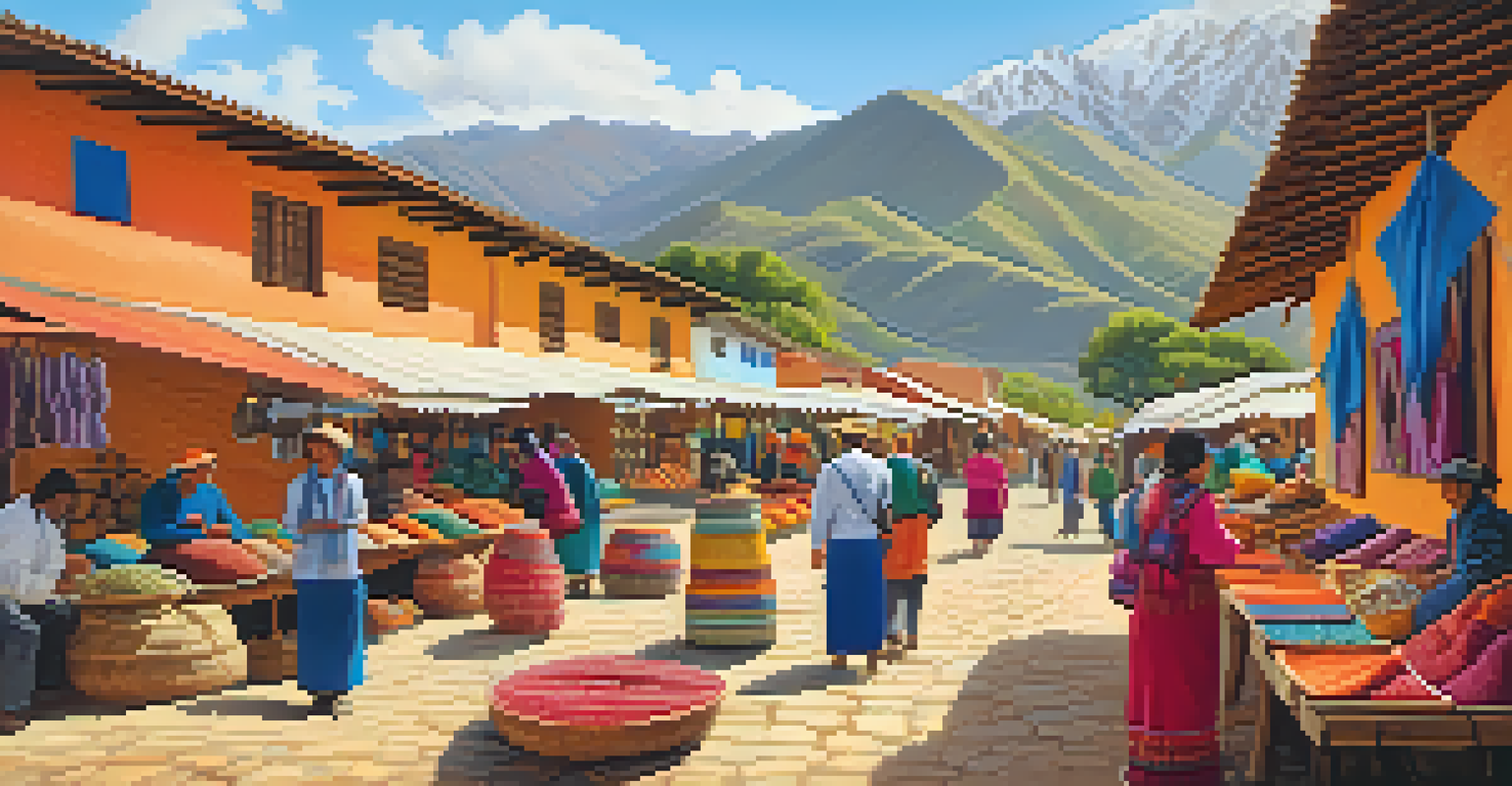How Ecotourism Supports Local Economies and Conservation in Peru

Understanding Ecotourism and Its Impact
Ecotourism is a responsible travel approach that emphasizes the conservation of natural environments while providing economic benefits to local communities. In Peru, this model encourages travelers to appreciate the country's rich biodiversity and cultural heritage. By participating in ecotourism, visitors contribute to both the preservation of pristine ecosystems and the livelihoods of local residents.
Ecotourism is a vital tool for sustainable development that can help preserve the environment while empowering local communities.
The essence of ecotourism lies in its commitment to sustainability, ensuring that tourism doesn't harm the environment. This is particularly vital in regions like the Amazon rainforest, where unique flora and fauna thrive. By promoting eco-friendly practices, ecotourism helps maintain the delicate balance between human activities and nature.
Moreover, ecotourism fosters a deeper understanding of environmental issues among travelers. As they engage with local guides and communities, visitors gain insights into the challenges faced by these ecosystems. This heightened awareness can inspire travelers to advocate for conservation efforts upon returning home.
Economic Benefits for Local Communities
One of the most significant benefits of ecotourism in Peru is the economic boost it provides to local communities. By attracting visitors, ecotourism creates jobs in areas such as hospitality, guiding, and handmade crafts. These opportunities can help reduce poverty and improve the quality of life for many residents.

The influx of tourists also encourages local businesses to thrive. Restaurants, markets, and artisan shops often experience increased sales, leading to a more vibrant local economy. This economic stimulation can be particularly important in remote areas, where traditional employment options may be limited.
Ecotourism Boosts Local Economies
Ecotourism in Peru creates jobs and stimulates local businesses, helping to reduce poverty and improve residents' quality of life.
Additionally, ecotourism often promotes the development of infrastructure. Improved roads, communication systems, and facilities can enhance the overall quality of life for residents. As communities grow economically, they may also have more resources to invest in education and healthcare.
Conservation Efforts Supported by Ecotourism
Ecotourism plays a crucial role in funding conservation initiatives in Peru. Entrance fees to national parks and reserves often go directly towards protecting these areas and their ecosystems. This financial support helps maintain biodiversity and protects endangered species.
Travel is about the experience, but ecotourism is about the impact—making sure that the places we visit are better off because we were there.
Moreover, local communities become stakeholders in conservation. When residents see the direct benefits of preserving their environment—such as increased tourism—they are more likely to engage in sustainable practices. This shift in mindset can lead to long-term environmental stewardship.
In many cases, ecotourism encourages the establishment of protected areas. These areas not only safeguard wildlife but also serve as attractive destinations for tourists. By creating a market for conservation, ecotourism ensures that preserving natural habitats becomes a viable economic strategy.
Cultural Preservation Through Ecotourism
Ecotourism in Peru goes beyond environmental conservation; it also supports the preservation of indigenous cultures. Many ecotourism initiatives involve local communities, allowing them to share their traditions, languages, and customs with visitors. This cultural exchange fosters mutual respect and understanding.
By participating in ecotourism, travelers can experience authentic cultural practices, such as traditional crafts, music, and dance. These experiences not only enrich the traveler's journey but also help sustain cultural heritage. When visitors show interest in local customs, it boosts community pride and encourages younger generations to maintain their heritage.
Conservation Efforts Funded by Tourism
Entrance fees and local engagement in ecotourism contribute directly to the protection of Peru's ecosystems and endangered species.
Additionally, ecotourism can provide funding for cultural preservation projects. Whether it's restoring historical sites or supporting local artisans, the economic opportunities from tourism can help safeguard cultural treasures for future generations.
Challenges Facing Ecotourism in Peru
While ecotourism offers numerous benefits, it also faces challenges that need addressing. One major issue is the potential for over-tourism, where the influx of visitors can strain natural resources and local infrastructure. This can lead to negative impacts on both the environment and the quality of life for residents.
Another challenge is ensuring that the economic benefits of ecotourism are equitably distributed. In some cases, large corporations dominate the industry, leaving local communities with minimal gains. To combat this, it is essential to prioritize community-based tourism initiatives that empower local residents.
Additionally, maintaining environmental standards is crucial. Without proper regulations and management, ecotourism can inadvertently contribute to environmental degradation. Continuous monitoring and education are necessary to ensure that ecotourism remains a sustainable and responsible practice.
The Role of Education in Ecotourism
Education plays a vital role in the success of ecotourism in Peru. By informing both tourists and locals about the importance of conservation, ecotourism can foster a culture of sustainability. Educational programs often focus on the unique ecosystems of Peru, highlighting the need for their protection.
Tour operators are increasingly incorporating educational elements into their experiences. Guided tours often include information about local wildlife, ecosystems, and conservation efforts. This not only enriches the tourist experience but also raises awareness about the challenges that these environments face.
Cultural Heritage Preservation
Ecotourism supports the sharing and preservation of indigenous cultures, fostering pride and sustainability among local communities.
Furthermore, educating local communities about sustainable practices can empower them to become active participants in ecotourism. By providing training in hospitality, guiding, and environmental conservation, communities can enhance their skills and improve their economic prospects.
Future of Ecotourism in Peru
The future of ecotourism in Peru looks promising, with growing interest from travelers seeking authentic and sustainable experiences. As awareness of environmental issues increases globally, more tourists are choosing destinations that prioritize conservation. This trend is encouraging for communities that rely on ecotourism for their livelihoods.
Moreover, innovative approaches to ecotourism are emerging. Community-led initiatives are gaining traction, allowing local residents to take charge of their tourism experiences. This not only enhances the authenticity of the offerings but also ensures that the economic benefits remain within the community.

As ecotourism continues to evolve, collaboration between government, NGOs, and local communities will be essential. By working together, stakeholders can create a sustainable framework that protects Peru's natural and cultural heritage while providing economic opportunities for its people.